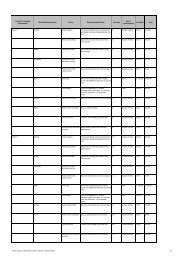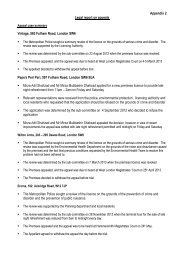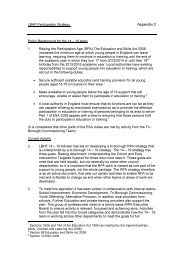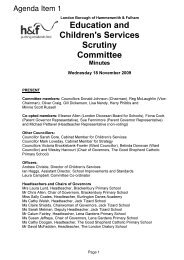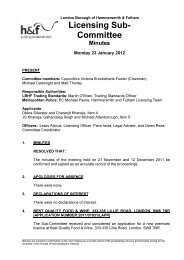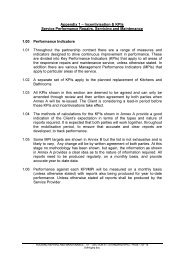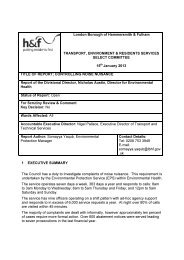DRAFT Pending approval by relevant Health and Wellbeing Boards
DRAFT Pending approval by relevant Health and Wellbeing Boards
DRAFT Pending approval by relevant Health and Wellbeing Boards
You also want an ePaper? Increase the reach of your titles
YUMPU automatically turns print PDFs into web optimized ePapers that Google loves.
Employment Support Joint Strategic Needs Assessment<br />
Stages of support – There are gaps in provision of some stages of employment support.<br />
In particular, there is significant need for in-work support both for clients getting jobs<br />
through specialist local support <strong>and</strong> for employed people struggling in work with<br />
common mental illnesses <strong>and</strong> musculoskeletal problems.<br />
Outcomes – It is clear that some providers are achieving a far smaller number of<br />
outcomes for the money received compared to others. This will need to be investigated<br />
further to underst<strong>and</strong> underlying reasons, as there may be legitimate reasons for this.<br />
Limitations of the mapping <strong>and</strong> subsequent data analysis come from gaps in the data<br />
<strong>and</strong> inconsistent terminology. Providers use different definitions of interventions (e.g.<br />
what constitutes in-work support) <strong>and</strong> outcomes (e.g. what constitutes a job outcome).<br />
Many providers do not routinely collect details of jobs obtained or impacts on health<br />
<strong>and</strong> wellbeing. Comparisons of provider performance are further complicated <strong>by</strong> their<br />
clients having different levels of need.<br />
National provision<br />
There have been developments in national provision, with increased focus on<br />
supporting clients challenged in the open job market. However, national evidence has<br />
identified major issues for all four national programmes around their ability fully to meet<br />
the needs of clients with mental illness <strong>and</strong> disabilities.<br />
JobCentre Plus (JCP) is the first point of contact for any client claiming benefits <strong>and</strong><br />
offers generic employment support with some specialist provision for clients with health<br />
problems. However, a national review identified that JCP staff may have ‘poor<br />
awareness of mental health issues’ (4). Co-production feedback identified that service<br />
users felt that JCP advisers were not always trained to support people with disabilities,<br />
particularly in communicating with clients with learning disabilities.<br />
The Work Programme is the Government’s flagship Welfare to Work programme <strong>and</strong> is<br />
being delivered in West London <strong>by</strong> three Prime contractors. Started in 2011, it aims to<br />
support clients with additional barriers to work, including claimants of Employment<br />
Support Allowance (health-related) <strong>and</strong> Job Seekers Allowance (not health-related).<br />
There are concerns that current early performance is not yet up to the levels expected.<br />
The Public Accounts Committee described one-year performance as ‘disappointing’.<br />
Overall outcomes were worse than previous programmes <strong>and</strong> considerably lower than<br />
DWP expectations (14). Clients with a disability were half as likely to have a job<br />
outcome as people without a disability. London performed worse for disabilities clients<br />
than the rest of the UK (15). However, there is considerable national <strong>and</strong> local<br />
commitment to improve on this early performance.<br />
Work Programme Primes don't offer enough support for people with complex needs.<br />
Co-production group feedback<br />
The two schemes designed specifically for clients with registered disabilities (Work<br />
Choice <strong>and</strong> Access to Work grants) are not available to clients already on the Work<br />
Programme. Furthermore, Work Choice requires clients to be able to work for 16 hours<br />
per week (16) which excludes many people with disabilities. A major national review<br />
JSNA<br />
Tri-Borough Joint Strategic Needs Assessment Report 2013 6



